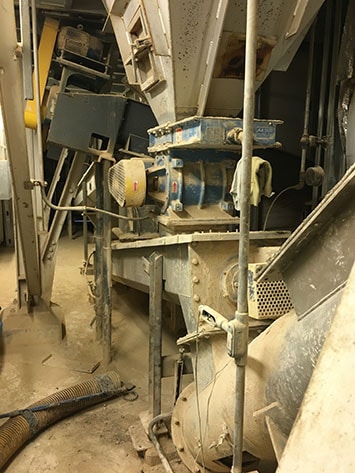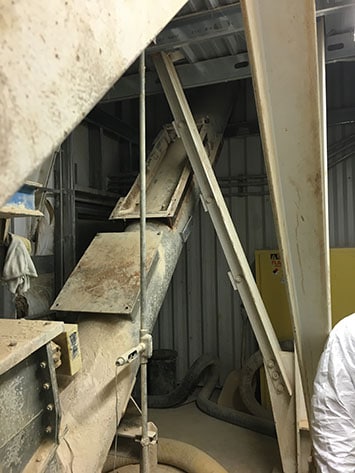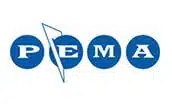Solving Problems with Inclined Screw Conveyors Johnson Controls in Florence, SC
Johnson Controls
Florence, SC
General Description
Johnson Controls (JCI) is an international company that started with the invention of the electric thermostat in 1885 and has grown to encompass a variety of industries. One of the foremost concerns for JCI is sustainability, which lead them to build a battery recycling facility in Florence, SC which opened in 2012. The recycling facility is designed to keep every trace of lead contained while processing an average of 1,600 batteries per hour. An impressive 99 percent of each battery is recycled and repurposed for future products.
Once the batteries have been broken up and separated by material, the lead is smelted in large furnaces. The entire process produces a significant amount of dust which is collected by baghouses and discharged into screw conveyors. Captured dust is routed back into the process so that nothing is wasted and, more importantly, nothing escapes into the environment. Due to the congested layout of the plant, these screw conveyors fed into a final inclined screw conveyor which is installed at a very steep angle. JCI continually had issues with this screw conveyor stalling and they looked to KWS for assistance. With over 45 years of experience designing screw conveyors, KWS identified the root cause of the problem and provided a viable solution.
Design Parameters
- Product Type – Lead Baghouse Dust
- Material Density – 87 Lbs. per Cubic Foot
- Capacity – 44,000 Lbs. per Hour
- Duty – 24 Hours per Day, 7 Days per Week
Solution Provided by KWS
The screw conveyors were part of an existing baghouse and air pollution control system supplied by a manufacturer other than KWS. Because of space requirements, the final screw conveyor was installed at a 42-degree incline. While the conveyor manufacturer did utilize short pitch in a tubular trough to counteract some conveying inefficiencies, the final screw conveyor was very inefficient and would plug up, shutting down the whole system. The downtime was very costly. Also, special precautions were required to work in the area due to the toxic lead dust.
Two engineers from KWS visited the facility to review the application and discuss the problems with JCI personnel. The root cause of the problem was incorrect conveyor design. The drive unit on the final screw conveyor was undersized for the application, causing the screw conveyor to plug up and stall out.
KWS has the engineering expertise to handle the most difficult applications. As the degree of incline increases, conveying efficiency is reduced and horsepower requirements increase due to the effects of gravity and bulk material fall back. Loss in conveying efficiency is approximately 40-percent on an incline of 42-degrees.
Screw conveyors located on inclines over 10-degrees must be designed to start and operate under upset conditions. An upset condition is caused when normal flow in an inclined screw conveyor is interrupted and the bulk material inside the conveyor slips back to the lower end, filling up the conveyor. Additional horsepower is required to restart and convey the bulk material because the conveyor will temporarily experience 100-percent trough loading.
The existing drive unit was 10-horsepower at 45-RPM. The speed (RPM) was too low to convey the material up the 42-degree incline. Also, the motor horsepower was insufficient to handle any type of upset condition. After careful review of the application and discussion with JCI, KWS recommended a 20-horsepower at 77-RPM drive unit for the final screw conveyor. The new drive unit has been in service since January 2017 and the final screw conveyor is running smoothly with no issues. KWS also replaced the drive unit on a second conveyor that was having similar problems. The second screw conveyor is running perfectly.
Testimonial
"The new drives are working great, the conveyors haven’t plugged since we installed them. We are looking forward to working with KWS on the redesign of our baghouse area!"
Ben T. – Plant Engineer, Johnson Controls

Inclined Screw Conveyor Transfers Lead Dust to 42-Degree Inclined Screw Conveyor

42-Degree Inclined Screw Conveyor Transfers Lead Dust Back to the Smelting Operation






